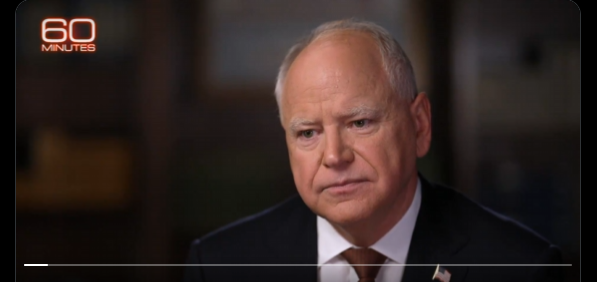During a special edition of “60 Minutes” that aired on Monday, a reporter questioned Minnesota Gov. Tim Walz about his propensity for dishonesty.
In the episode, which included interviews with Walz and Vice President Kamala Harris, network correspondent Bill Whitaker noted that Walz had “been criticized for embellishing or telling outright falsehoods about his military record and about his travels to Asia in the 1980s.
Whitaker said, “In your debate with JD Vance, you said, ‘I’m a knucklehead at times,’ and I think you were referring to the time that you said that you were in Hong Kong during the Tiananmen Square unrest when you were not.”
“Yeah,” replied Walz.
Whitaker then questioned, “Is that kind of misrepresentation? Isn’t that more than just being a knucklehead.
“I think folks know who I am, and I think they know the difference between someone expressing emotion, telling a story, getting a date wrong by– rather than a pathological liar like Donald Trump,” Walz claimed.
Whittaker fired back: “But I think it comes down to the question of whether— whether you can be trusted to tell the truth.”
Walz concluded, “Yeah, well, I can. I think I can. I will own up to being a knucklehead at times, but the folks closest to me know that I keep my word.”
WATCH:
In recent months, Walz has faced criticism for making misleading and outright false statements about his background.
He was accused of stolen valor after he inaccurately claimed to have carried weapons “in war,” a statement he attributed to a “grammar” mistake when confronted by CNN anchor Dana Bash.
In August, a video of Walz resurfaced where he dramatically embellished his military record to claim, falsely, that he had been deployed to a war zone.
In the C-SPAN video, then-U.S. Rep. Walz is telling a Gold Star family — that is, a family who has lost a loved one in battle — during a hearing on PTSD that he had been deployed to Afghanistan in 2004 in support of Operation Enduring Freedom. He further claimed that troops he was responsible for had suffered from some mental health issues and were shown “the horse whisperer” and “told us to be nice” when they returned home.
“And both of you, with your keen understanding of how this works, especially from National Guard families, I can tell you this, having been one of those that came back, we were in support of OEF, but being — sitting in there with OEF, OIF veterans. When we came back, they showed us the horse whisperer and told us to be nice when we went home. And that was the extent of it,” Walz claimed.
“That was in 2004. Now, I’m proud to say that because of the people sitting in here and people who came before me, things have changed over the last four years. They have not changed enough. But Mr. Kennedy is following and moving something forward that the late senator from Minnesota, Sen. [Paul] Wellstone advocated so clearly: Mental health parity and this issue of de-stigmatizing mental health, of understanding,” Walz continued.
“And I, being in there and knowing as a first sergeant, knowing exactly what you’re saying and watching as people aren’t trained on this, that there’s a discrimination that goes against a soldier who has the courage, the fortitude, and, as you said, the insight to admit this. So there’s a couple of things I want to ask you,” he said.
Walz served in the Army and Army National Guard for 24 years but he never served in combat. In fact, he decided to retire once his unit got orders to deploy to Iraq rather than deploy with them, a decision that has earned him wide condemnation from Trump running mate Vance, who did deploy to Iraq as a Marine public affairs officer, as well as senior enlisted personnel from Walz’s former unit.



